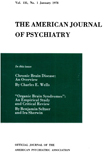Enhancement of Imipramine by Thyroid Stimulating Hormone: Clinical and Theoretical Implications
Abstract
Thyroid stimulating hormone, when combined with imipramine, produces a more rapid recovery from depression than does imipramine alone. It seems more potent than triiodothyronine in potentiating imipramine, but dose differences prevent accurate comparison. This hormone has the clinical disadvantage of being long acting and difficult to control. Depressed patients show thyroid indices within the normal range. Serum indices of thyroid state respond normally to TSH injection, but ankle reflex time is not accelerated. Tantalizing clues have appeared, but the mechanism by which thyroid hormones potentiate tricyclic antidepressants remains unknown.
Access content
To read the fulltext, please use one of the options below to sign in or purchase access.- Personal login
- Institutional Login
- Sign in via OpenAthens
- Register for access
-
Please login/register if you wish to pair your device and check access availability.
Not a subscriber?
PsychiatryOnline subscription options offer access to the DSM-5 library, books, journals, CME, and patient resources. This all-in-one virtual library provides psychiatrists and mental health professionals with key resources for diagnosis, treatment, research, and professional development.
Need more help? PsychiatryOnline Customer Service may be reached by emailing [email protected] or by calling 800-368-5777 (in the U.S.) or 703-907-7322 (outside the U.S.).



